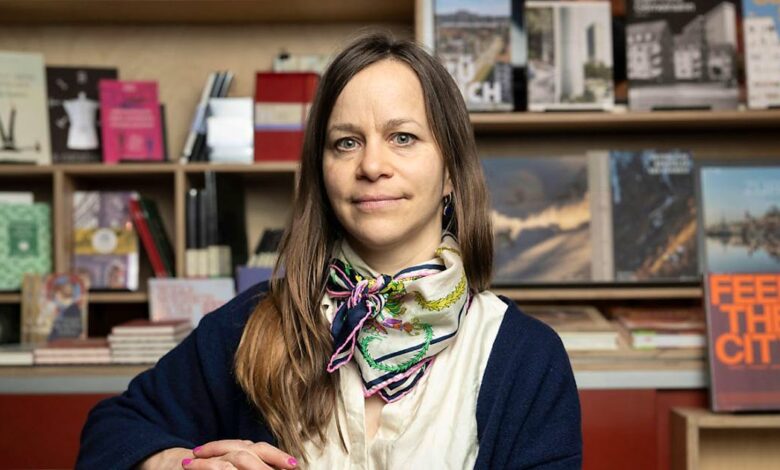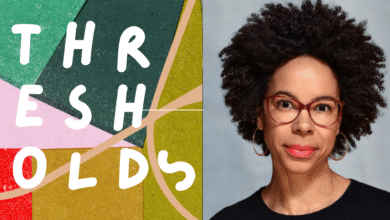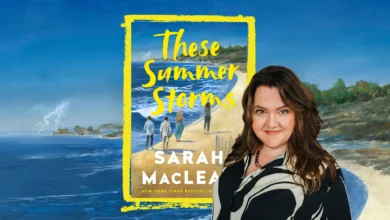Literature: Literaare: a place for discoveries and encounters for 20 years

Keystone
Literaare in Thun starts its 20th edition today (-09.03.). Founder Tabea Steiner explains what still makes up the DNA of the small literary festival, which is largely organized on a voluntary basis.
The Thurgau author and literary mediator Tabea Steiner likes to look back on how the literaare has changed: for example, who the important writers were 20 years ago who seemed so unapproachable, or the fact that audiences today are also open to completely different names.
Independent of new publications
Steiner and his team program independently of new publications, in contrast to large festivals such as the Solothurn Literature Festival or BuchBasel, which are tied to them. “When I wanted to invite the German author Monika Zeiner in 2016, she said apologetically that she didn’t have a new book. That doesn’t play the main role for us. We wanted ‘The Order of the Stars over Como’ (2013),” Steiner recalls in an interview with the Keystone-SDA news agency.
The Literaare has thus become a place for many to discover books; often they are personal favorites of the team. Steiner is particularly proud, for example, that the current German Book Prize winner Martina Hefter was already in Thun three years ago. “We are a small festival that facilitates encounters. People appreciate that too.”
This was particularly successful in 2016 with Monika Rinck, Ulrich Peltzer and Terézia Mora, who also attended each other’s readings and asked each other questions in the audience discussions. “The whole festival was one big conversation. Everything seemed to be connected, everyone got in touch with each other. Even with the audience. You can’t plan something like that.”
Steiner remembers Hanswalter Graf’s stage sets as another personal highlight: the Thun artist selected props from the local Alte Oele theater for readings in 2018. “There was a completely new stage set for every reading. When the curtain opened, a murmur went through the Säli. It was so poetic and very special,” Steiner recalls of the 13th edition.
With a writing competition right from the start
Since the very first edition, there has been a writing competition that gives three writers who have not yet published the opportunity to appear at the festival. Mariann Bühler and Ronya Othmann, who will both be reading at the anniversary, have won awards here, as have Heinz Helle and Kim de l’Horizon. The festival founder is almost most pleased that their biographies are a little bit linked to Literaare. It is always important to her to create a platform – also for young talent or illustration.
Tabea Steiner founded Literaare in 2004. At the time, she was in her early twenties, studying German and history and had just won a writing competition. The award meant that she had to organize a reading in her home town: “I was living in Thun at the time and there was no place for readings here. Ultimately, that was the impetus. I thought I would actually like to organize something like that.”
After the first readings, the idea of a festival grew – even if she didn’t know exactly how it would work at first, Steiner laughs. “The city supported Literaare right from the start – initially with very little money. The deputy head of the culture department at the time, Philipp Burkard, is also a literary scholar and appreciated the fact that someone young wanted to try something, and in retrospect I really appreciate this trust.”
For the first editions, Steiner put together the program herself and organized the festival with the help of her circle of friends. Hugo Loetscher performed the first opening in the foyer of the Kunstmuseum, which was already on a Friday back then. On Saturday, Lukas Hartmann read at the Hotel Zunfthaus zu Metzgern, and in the evening the winners of the first writing competition and authors from the Upper Valais anthology “Talwind” read at the cult restaurant Mokka in Thun. A Sunday matinee with Erika Burkart and Ernst Halter was planned to round off the event. “Unfortunately, that was our first canceled event because she was ill and snowed in,” says Steiner. “So after the first literaare, we all sat a bit depressed in the Kunstmuseum bistro and decided: We’ll do it again!”
Never enough money
Literaare grew steadily over the first ten years. A team was added and more events were organized. To this day, a lot of voluntary work goes into every festival: “We’ve never managed to raise enough money to really pay for our work,” says Steiner. Much of the work is still lovingly homemade: “We cut the tickets apart ourselves, for example.”
When asked which guests she would like to see on her personal list for Thun, Steiner brushes it off and emphasizes that the aim is not to invite the mega-big names. “Only if we are really enthusiastic.” Perhaps the Nobel Prize winners Olga Tokarczuk or Elfriede Jelinek, but unfortunately the latter does not do readings. That’s not a bad thing, however, because Steiner believes the most important thing is “that the Literaare is a place that contributes to conversations. At the moment, the most important thing is to have uplifting, communal experiences and to share joy together. “*
*This text by Philine Erni, Keystone-SDA, was realized with the help of the Gottlieb and Hans Vogt Foundation.


